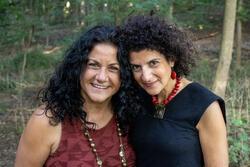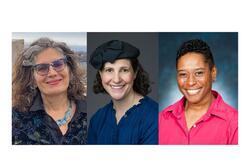7 Questions For Cantor Jacqueline Rafii
JWA: How would you describe the Jewish community and culture in Los Angeles, where you live?
Jacqueline Rafii: In two words: vibrant and diverse! As the daughter of immigrants from Iran, and a first-generation American who has spent her entire life in Los Angeles, I have experienced this city as a melting pot that celebrates Ashkenazi, Sephardi, and Persian-Jewish cultures.
My parents, like hundreds of thousands of other Jews, fled the Islamist regime of Iran after the 1979 Revolution, leaving behind a rich 2,000-year history to seek a better life in the United States. The Persian Jews who settled in Los Angeles, all of whom had shared this traumatic experience and history, became a close-knit, dynamic community that carried on their Persian-Jewish customs, language, and culture.
However, my parents made the unique decision to join an Ashkenazi Reform synagogue. We were the first Persian family to join Wilshire Boulevard Temple in 1991. As a result, I became deeply familiar with Ashkenazi customs, music, and community, integrating them into my personal practice and identity as a Persian-Jewish American. My professional journey involved experiences with culturally diverse communities at Sinai Temple, Shomrei Torah Synagogue, and now, Valley Beth Shalom.
Today, a prayer service that I lead at Valley Beth Shalom (a thriving Conservative synagogue in Encino, where I am the Senior Cantor) may include Eastern European davening, American melodies, and a few Sephardi folk songs integrated with Hebrew text. A Persian-Jewish wedding will include the (Ashkenazi) hora. At synagogues throughout Los Angeles, presentations about Persian-Jewish music and concerts of Jewish melodies from around the world (both of which I have planned at Valley Beth Shalom), are embraced and well-attended by community members from various backgrounds. Just this past March, Valley Beth Shalom hosted a community-wide Nowruz (Persian New Year) celebration.
JWA: Before you became a cantor, you were a practicing lawyer. What inspired your change in career?
JR: I always felt the call to become a cantor, at least since my bat mitzvah. There was not much precedent in the Persian community for women to pursue cantorial careers. There are currently only three Persian woman cantors in the United States; there was only one when I first considered this path. Cantorial school is a five-year commitment to graduate school and seminary. I went to law school as a practical choice, knowing the education would serve me no matter what path I chose in life.
My third year into practicing entertainment law, I knew something was amiss. I worked at a wonderful firm with people I loved. The work was interesting and eclectic. But many mornings, I would wake up with the nagging sense that I was betraying my life’s purpose. My now-husband would regularly ask, “What are you waiting for?” One day, I was attending the performance of an artist whom my law firm represented. The group began singing a beautiful song, and I heard a lyric along the lines of, “How long will you wait before you die, to pack up your bags and fly?” With tears streaming down my face, I knew I could no longer ignore the call.
JWA: Your musical work celebrates your heritage as a first-generation Persian-American. Are there any Jewish traditions unique to the Persian-Jewish community?
JR: Yes, and I smile as I think of the warmth and fun of these special traditions, many of which I am continuing in my own Persian-Ashkenazi home!
Ingrained within Persian-Jewish life is the sanctity of celebrating Shabbat dinner with family—ranging from immediate family to an extended family and family-friends dinner of 50. A particular, tasty hors d’oeuvre graces the Persian-Jewish table on Shabbat, called ghondi (imagine chickpea dumplings with diced meat, resembling small matzo balls).
During the Passover Seder, there is a custom of playfully hitting one another with scallions while we sing “Dayeinu,” which some say is a reenactment of our ancestors as slaves in Egypt being whipped by their taskmasters.
Persian Jews are also known for their widespread and passionate support of and connection to Israel. My paternal grandfather used to walk around his home in Tehran and sing Hatikvah, Israel’s national anthem. My maternal grandfather made multiple trips to Israel on horseback. This connection to Israel that extends to Persian Jews living all around the world may be due to the history of Jews in Persia: Cyrus the Great, who ruled the Persian Empire in the sixth century BCE, allowed Jewish residents who had been exiled from Israel to return to their homeland. (He also gave them the freedom to remain in Persia and freely practice their faith.)
JWA: You’ve received a lot of recognition for your work as a musician and composer, particularly for your work preserving Persian-Jewish prayer melodies. What does this research look like?
JR: It all began when my dad found and shared with me a cassette tape of the recorded voice of my grandfather Yehuda Rafii, of blessed memory, chanting the blessings at a Passover Seder that took place in Tehran in 1971. I began to take an interest in Persian-Jewish prayer melodies, which were passed down orally and had never been notated (i.e., having the notes of the melody written down in a format others can sing/play).
As part of my master’s thesis in cantorial school, I set out to collect as many melodies as I could from primary sources—those living in the United States who grew up in Iran and had learned these melodies. I interviewed each person to uncover the story of their life and more about the melody they were teaching me. I recorded the melody (often on my phone, or in one instance, it was left as a message on my voicemail) and I notated it and added chords so that it could be sung and played by others. My goal is to preserve these melodies and integrate them into American Jewish prayer music for those who are interested.
JWA: What is your favorite song to lead during weekly services?
JR: Two prayers come to mind: Ahavah Rabbah (boundless love), which is part of the morning prayer service; and Mi Chamocha (who is like You), which is recited both morning and night. I love the message of Ahavah Rabbah: God loves each one of us infinitely, and in turn, has granted every human being with the endless capacity to love. This reminds us to be open-hearted.
The imagery of Mi Chamocha strikes me each time I chant it: It recalls the very moment after the Israelites have successfully crossed the sea and made it to their freedom. The song is often attributed to the prophetess Miriam, a strong woman leader in our Jewish history and tradition, and it brings to mind a sense of strength, gratitude for miracles, and connection to our Jewish family.
JWA: You're a prominent leader at one of the largest Conservative synagogues in the United States. How do you navigate the sexist systems still present in the Jewish community?
JR: Fortunately, Valley Beth Shalom synagogue is a fully egalitarian community, celebrating the contributions, active involvement, ritual observance, and leadership of both men and women. Clearly, choosing a woman to become its Senior Cantor is a reflection of Valley Beth Shalom’s confidence in the leadership of women, a value for which I am deeply grateful.
However, there is a concept observed in some sects of Orthodox Judaism known as kol isha, which prohibits men from listening to the solo singing voice of a woman. Throughout my life, I have attended many Jewish events where women’s singing voices were not welcome because of the presence of some who observed this prohibition. At first, these were confusing and often painful experiences, but I now do not take it personally and respect that people adhere to traditions that are meaningful to them. As long as it is not imposed on me and does not harm me or others—and this is a whole other complex conversation—I know where my personal boundaries lie in terms of attending and/or discussing such events.
JWA: Lastly, the High Holy Days are almost here! How do you prepare for this time of year?
JR: When it comes to preparing for the High Holy Days, cantors have an unfair advantage. We get to pore over all of the High Holy Day prayers as we rehearse with our choirs, practice with our musicians, and review what we'll be leading. My personal preparation each year involves taking extra time with one or two prayers that stand out to me—letting these prayers sit on my heart and move through me.
This year, I pause painfully on [the line from Unenateh Tokef] B’rosh Hashanah yikateivun, uv’Yom Tzom Kippur yeichateimun…ut’shuvah, ut’filah, utzedakah ma’avirin et-roa hagzeirah. (On Rosh Hashanah our destiny is written, and on the fast day of Yom Kippur, it is sealed: who will live, who will die; who by fire, sword, hunger, plague… but repentance, prayer and charity can transform the decree.)
It has been a heart-shattering time for the Jewish people since October 7. How can I chant this prayer, thinking about the fate of the hostages, so many others in our Jewish family who were murdered this year, and the rise in antisemitism around the world? Am I really to believe that those who perished or continue to suffer simply didn’t do enough to change their destiny?
After much reflection and text study, I have come to believe that we may not comprehend what happens, but we can transform how we respond to it. Our people are a people of action. We find light in the darkness, and hope in the most despairing of times. (Here's a recent song I wrote about this hope, called Never Be Gone.)
In this difficult time, we have found surprising reserves of resilience and peoplehood. We continue to stand up for our values and advocate for moral clarity and courage. Reflecting on this High Holy Days prayer, I am comforted to know we have the power to transform our destiny by how we respond to what happens.








May HaShem always guide your steps and protect you and your dear ones!
Great job Cantor Raffi.
All the best and Shana tova.😇🥰🙏🙏
Farzaneh Farnoush